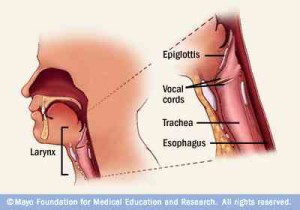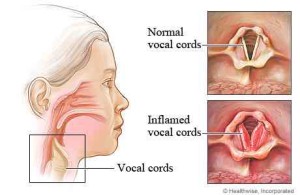Have you ever lost your voice and tried different myths or remedies to get it back? What really happens when you lose your voice and what can you do to speed up getting it back?
HOW TO RECOVER YOUR VOICE AFTER LOSING IT- MYTHS REVEALED
There’s two flaps of elastic tissue that produce sound by vibrating. These are called your vocal cords. Many people confuse the location of the vocal cords. Especially when they lose their voice, they connect swallowing and “coating the throat” as a way to help or fix a hoarse voice.
that produce sound by vibrating. These are called your vocal cords. Many people confuse the location of the vocal cords. Especially when they lose their voice, they connect swallowing and “coating the throat” as a way to help or fix a hoarse voice.
When your vocal cords aren’t in use, they are relaxed open. When you speak, whisper, or yell, the cords slap together close and air from your lungs pushes in between them, causing vibration and producing sound.
Vocal cords can become irritated by many reasons. It can be an infection, inflammation and irritation from foods, talking too much, yelling, poor projection of air during speaking voice and so much more. The medical term is called “laryngitis”, and most clear up within two weeks.
Some things like smoking , alcohol, stress, and hormones can cause chronic laryngitis which is permanent damage to the vocal cords.
Overusing your vocal cords cause them to be irrupted and swollen, inflamed, and that causes you to have a hoarse voice or to lose it. 
The larynx houses the vocal cords. Sound is produced when air passes over them, causing vibrations that produce the sounds of speech. When the vocal cords, which are simply stretched “strings” of tissue in the larynx, become swollen and inflamed, the sounds become distorted and your voice becomes hoarse.
The same hoarseness can result from laryngitis, inflammation of the vocal cords due to an infection, which can be either bacterial or viral. Just like with yelling, the vocal cords swell which changes the sound of your voice.
HOW TO RECOVER YOUR VOICE AFTER LOSING IT- MYTHS REVEALED
Many people believe that drinking products that claim to recover your voice or teas to soothe your vocal cords will help get them back quicker.
Science proves that’s impossible! The vocal cords are in 1 “pipe” and the pipe that liquids go down, is a different pipe.
Your vocal cords are in the larynx which is housed in the trachea. The trachea is the pipe that is in the front of the next and feels rigid and bumpy when you run your fingers down the front of your next. The Esophagus is the other pipe, the one where liquids and foods go down to the digestive system.
When you drink liquids, a flap covers the trachea to prevent liquid going down the wrong pipe. You’ve heard that expression before, right? Probably if you have ever choked by doing this.
So will teas or liquid remedies help? Yes and no, no because it doesn’t run over the vocal cords. Yes, only because of the steamy liquid creates more moisture and hydrates you more. It’s also a mental thing. We “feel” like it’s running over the cords.
Another myth people try are the lozenges or throat sprays. This is actually VERY dangerous to use. Typically, it will numb or decrease inflammation on the cords, in which you may recover your voice back somewhat. But, once we get more back, we push harder on the cords to compensate and over use them even more in this delicate state. With them being “numbed” up, you don’t feel it and actually risk more damage, even permanent damage. Avoid using these at all costs.
HOW TO RECOVER YOUR VOICE AFTER LOSING IT?
Here are the best techniques to help recover your voice:
1-Steamy Shower or Humidifier. The hot moisture really gets to the cords as you are breathing it in, thus passing through the right pipe. The trachea.
2-Ibuprofin or other. This will help decrease inflammation, in which is why your cords are hoarse, they are inflamed.
3- Warm up exercises. Doing scales while sounding like yogi bear will help decrease the inflammation. Watch this video to learn how to do it: http://youtu.be/0yYTFrzNo4c
4- Rest for a day or two. Be careful to not speak or whisper. Whispering causes a lot of stress on the cords. It’s best to speak softly if you really need to speak.
5-Stay Hydrated- drink lots of fluids. Drink at least half the ounces of water in which you weigh. Example: if you weight 150lbs, drink at least 75 ounces.
If the hoarseness lasts for more than a week, see your health care provider.
Click SHARE to help others who may suffer from this condition frequently.

